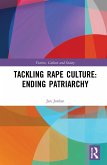Is justice possible for a woman raped in contemporary patriarchal culture? This book explores one of the major conundrums of our time: given all the feminist activism and reforms of the last 50 years, why does rape remain so prevalent and justice so elusive? In exploring these questions, Jan Jordan takes us back into the patriarchal origins of our rape culture in order to trace the connections between past laws and current justice realities. Her examination covers developments in police and court processes and explores the connections between men, masculinity, and rape before considering the scope of rape prevention. She argues the need for urgent transformation of the rape-condoning cultures that currently make it impossible for rape prevalence to abate or for rape victims to receive justice.
Fifty years of feminist critique, official reports and new policies, but minimal change in rape prevalence and stereotypes. Jan Jordan shows why: Sexual violence against women is sustained by deep-seated gender inequalities, patriarchal institutions and damaging cultures of masculinity. Yet this is an ultimately optimistic book: all these things can change. And should.
-Raewyn Connell, author of Gender: In World Perspective
Jan has been thinking and writing about rape for three decades, and this book is a culmination and a challenge - that to create social justice we need deeper understanding of why and how sexual violence is a fault line in patriarchy.
- Liz Kelly, Director: Child and Woman Abuse Studies Unit, London Metropolitan University
Jordan provides an essential history of the evolution of justice responses to rape and efforts towards change that end not far from where they started. Non-validating, silencing, and traumatizing treatment continue to emanate from the very systems sustained across the globe assigned the duty of norm enforcement. She embeds rape into patriarchy to shine light on the false beliefs and stereotypes, as well as the power to control, that stain both citizen response and "justice" decisions at all levels of the criminal legal system. In this age of empirically-supported, multi-level explanations for why rape happens and then is disappeared, it is crucial that many years of scholarship elaborating the role of gender dynamics not be lost. The evocative words of victims and key players are powerful voices throughout and anchor timeless scholarship into lived experience.
- Mary Koss, Regents' Professor, Mel and Enid Zuckerman College of Public Health, University of Arizona
This book should not be read as a counsel of despair as Jan Jordan describes the sustaining characteristics of gender inequalities leading to the ossification of reform attempts aimed at preventing sexual violence against women and girls. The ubiquity of rape across time and continents is documented by case examples, original research and international studies. But it is through her meticulous historical analysis and international comparisons that we come to a greater understanding of why men not only rape but are protected from sanction. Therein lies hope that with such knowledge society can do better.
- Jennifer Brown, Visiting Professor, Mannheim Centre for the Study of Criminology and Criminal Justice, London School of Economics and Political Science
-Raewyn Connell, author of Gender: In World Perspective
Jan has been thinking and writing about rape for three decades, and this book is a culmination and a challenge - that to create social justice we need deeper understanding of why and how sexual violence is a fault line in patriarchy.
- Liz Kelly, Director: Child and Woman Abuse Studies Unit, London Metropolitan University
Jordan provides an essential history of the evolution of justice responses to rape and efforts towards change that end not far from where they started. Non-validating, silencing, and traumatizing treatment continue to emanate from the very systems sustained across the globe assigned the duty of norm enforcement. She embeds rape into patriarchy to shine light on the false beliefs and stereotypes, as well as the power to control, that stain both citizen response and "justice" decisions at all levels of the criminal legal system. In this age of empirically-supported, multi-level explanations for why rape happens and then is disappeared, it is crucial that many years of scholarship elaborating the role of gender dynamics not be lost. The evocative words of victims and key players are powerful voices throughout and anchor timeless scholarship into lived experience.
- Mary Koss, Regents' Professor, Mel and Enid Zuckerman College of Public Health, University of Arizona
This book should not be read as a counsel of despair as Jan Jordan describes the sustaining characteristics of gender inequalities leading to the ossification of reform attempts aimed at preventing sexual violence against women and girls. The ubiquity of rape across time and continents is documented by case examples, original research and international studies. But it is through her meticulous historical analysis and international comparisons that we come to a greater understanding of why men not only rape but are protected from sanction. Therein lies hope that with such knowledge society can do better.
- Jennifer Brown, Visiting Professor, Mannheim Centre for the Study of Criminology and Criminal Justice, London School of Economics and Political Science








